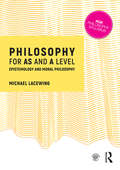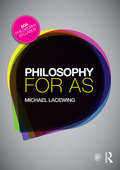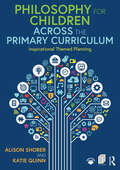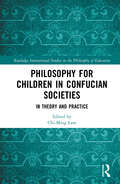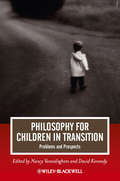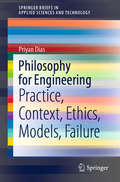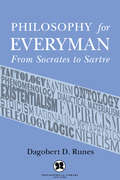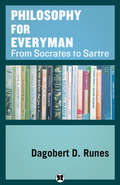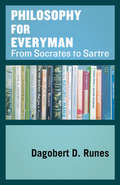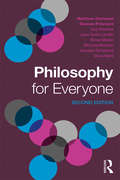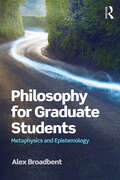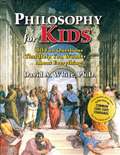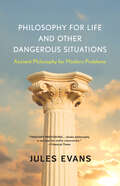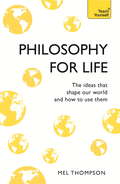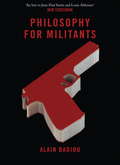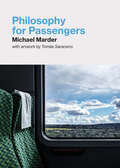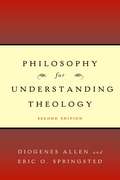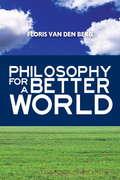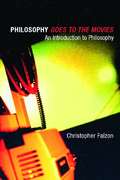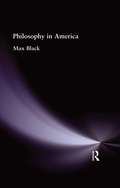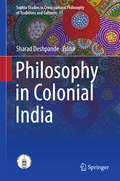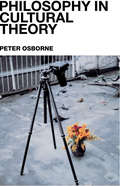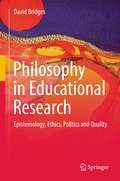- Table View
- List View
Philosophy for AS and A Level: Epistemology and Moral Philosophy
by Michael LacewingPhilosophy for AS and A Level is an accessible textbook for the new 2017 AQA Philosophy syllabus. Structured closely around the AQA specification this textbook covers the two units shared by the AS and A Level, Epistemology and Moral Philosophy, in an engaging and student-friendly way. With chapters on 'How to do philosophy', exam preparation providing students with the philosophical skills they need to succeed, and an extensive glossary to support understanding, this book is ideal for students studying philosophy. Each chapter includes: argument maps that help to develop student’s analytical and critical skills comprehension questions to test understanding discussion questions to generate evaluative argument explanation and commentary on the AQA set texts ‘Thinking harder’ sections cross-references to help students make connections bullet-point summaries of each topic. The companion website hosts a wealth of further resources, including PowerPoint slides, flashcards, further reading, weblinks and handouts, all structured to accompany the textbook. It can be found at?www.routledge.com/cw/alevelphilosophy.
Philosophy for AS: Epistemology and Philosophy of Religion
by Michael LacewingPhilosophy for AS is an accessible textbook for the new 2014 AQA Advanced Subsidiary Philosophy syllabus. Structured closely around the AQA specification this textbook covers the two units, Epistemology and Philosophy of Religion, in an engaging and student-friendly way. With chapters on 'How to do philosophy', exam preparation providing students with the philosophical skills they need to succeed, and an extensive glossary to support understanding, this book is ideal for students studying philosophy. Each chapter includes: explanation and commentary of the AQA anthology texts comprehension questions to test understanding discussion questions to generate evaluative argument 'going further' sections for advanced study cross-references to help students make connections bullet-point summaries of each topic. The companion website hosts a wealth of further resources, including PowerPoint slides, flashcards, further reading, weblinks and handouts, all structured to accompany the textbook. It can be found at www.routledge.com/cw/alevelphilosophy.
Philosophy for Children Across the Primary Curriculum: Inspirational Themed Planning
by Katie Quinn Alison ShorerThis is an easy-to-use, theme-based resource book for Philosophy for Children (P4C) practitioners in primary school settings. It covers ten popular themes which include many current affair issues and enduring curriculum themes such as artificial intelligence, biodiversity, resilience, and waste. Each theme provides planning for every subject and links to the relevant English national curriculum expectations. Offering ideas for a year’s worth of work, it can be dipped into for inspiration or used for step-by-step sessions. There are links to video clips, websites, and stories that teachers and practitioners can use to base their concept exploration and enquires on. Presenting a range of philosophical ideas, activities, and resources, this book is essential for all primary P4C facilitators excited by embedding and exploring philosophy across the curriculum.
Philosophy for Children Across the Primary Curriculum: Inspirational Themed Planning
by Katie Quinn Alison ShorerThis is an easy-to-use, theme-based resource book for Philosophy for Children (P4C) practitioners in primary school settings. It covers ten popular themes which include many current affair issues and enduring curriculum themes such as artificial intelligence, biodiversity, resilience, and waste.Each theme provides planning for every subject and links to the relevant English national curriculum expectations. Offering ideas for a year’s worth of work, it can be dipped into for inspiration or used for step-by-step sessions. There are links to video clips, websites, and stories that teachers and practitioners can use to base their concept exploration and enquires on.Presenting a range of philosophical ideas, activities, and resources, this book is essential for all primary P4C facilitators excited by embedding and exploring philosophy across the curriculum.
Philosophy for Children in Confucian Societies: In Theory and Practice (Routledge International Studies in the Philosophy of Education)
by Chi-Ming LamThis book contributes to the theory and practice of Philosophy for Children (P4C), with a special emphasis on theoretical and practical issues confronting researchers and practitioners working in contexts that are strongly influenced by Confucian values and norms. It includes writings by prominent P4C scholars from four Confucian societies, viz., Mainland China, Hong Kong, Taiwan, and Japan. These writings showcase the diversity of the P4C model, providing a platform for researchers and practitioners to tell their stories in their own Confucian cultural contexts. The research stories in the first part of the book are concerned with assessing the impact of traditional Confucian norms, promoting critical thinking, reconstructing the notion of community of inquiry, creating moral winds, integrating philosophy into the school curriculum, and localizing teaching methods and materials. Four issues are discussed in the second part of the book: the tension between Confucianism and powerful thinking; cultural challenges for practitioners; the transformation of harmony; and the conception of family. Taken as a whole, the book provides fresh insights into whether and how P4C’s Westerninfluenced theories and practices are compromised when they are applied in non-Western, or rather Confucian, contexts. A must-read for anyone interested in the theory and practice of P4C and Confucianism in general.
Philosophy for Children in Transition: Problems and Prospects (Journal of Philosophy of Education #24)
by David Kennedy Nancy VansieleghemPhilosophy for Children in Transition presents a diverse collection of perspectives on the worldwide educational movement of philosophy for children. Educators and philosophers establish the relationship between philosophy and the child, and clarify the significance of that relationship for teaching and learning today. The papers present a diverse range of perspectives, problems and tentative prospects concerning the theory and practice of Philosophy for Children today The collection familiarises an actual educational practice that is steadily gaining importance in the field of academic philosophy Opens up discussion on the notion of the relationship between philosophy and the child
Philosophy for Engineering: Practice, Context, Ethics, Models, Failure (SpringerBriefs in Applied Sciences and Technology)
by Priyan DiasThis book highlights the unique need for philosophy among engineers, which stems from issues regarding their knowledge (epistemology), role or being (ontology) and influence (ethics). It discusses practice, context, ethics, models and failure as key aspects of engineering, and provides an easy but essential introduction to philosophy for engineers by presenting four key philosophers and linking them to these aspects: Karl Popper (failure), Thomas Kuhn (models), Michael Polanyi (practice & ethics) and Martin Heidegger (context & ethics). Popper, Kuhn and Polanyi are philosophers of science (epistemologists) who have challenged the view that science is a ‘cool, detached’ discipline, since it also depends on human imagination (Popper), consensus (Kuhn) and judgment plus artistry (Polanyi); factors that are central to engineering. Heidegger (an ontologist) critiqued technology on the one hand (ethics), but also stressed the importance of ‘doing’ over ‘knowing,’ thus ‘authenticating’ the highly pragmatic engineering profession. Science is the ‘core’ component of engineering, which is overlaid by a variety of heuristics . Practice-based knowledge can be formalized, with artificial intelligence (AI) offering a valuable tool for engineering, just as mathematics has done for science. The book also examines systems thinking in engineering. Featuring numerous diagrams, tables and examples throughout, the book is easily accessible to engineers.
Philosophy for Everyman
by Dagobert D. RunesPhilosopher Dagobert D. Runes introduces readers to the philosophical movements throughout the ages--traveling back to the time of the ancient Greeks all the way up to the twentieth-century with philosophies such as Existentialism--in this groundbreaking guide, Philosophy for Everyman from Socrates to Sartre. Readers will appreciate Runes's careful breakdown of concepts and his historical approach to philosophy. His engaging prose, written for the general reader, makes philosophy enjoyable and accessible. Dagobert D. Runes was a philosopher and author. He was the founding publisher of The Philosophical Library, where he worked to bring philosophical texts to a general audience. Runes was a colleague and friend of Albert Einstein and many other influential philosophers and scientists. Runes is responsible for publishing an English translation of Marx's On the Jewish Question, which he published under the title A World without Jews, and for editing The Dictionary of Philosophy, published in 1942.
Philosophy for Everyman from Socrates to Sartre
by Dagobert D. RunesPhilosopher Dagobert D. Runes introduces readers to the philosophical movements throughout the ages--traveling back to the time of the ancient Greeks, all the way up to the twentieth century, with philosophies such as Existentialism--in this groundbreaking guide, Philosophy for Everyman from Socrates to Sartre. Readers will appreciate Runes' careful breakdown of concepts and his historical approach to philosophy. His engaging prose, written for the general reader, makes philosophy enjoyable and accessible.
Philosophy for Everyman: From Socrates to Sartre
by Dagobert D. RunesThis sweeping history of philosophy by the author and founder of the Philosophical Library ranges from the pre-Socratics to existentialism. In this historical survey, Dagobert D. Runes introduces readers to the major developments in philosophical inquiry that began with the ancient Greeks. In clear and accessible prose, he traces the progression of thought through influential figures such as Jesus, Muhammad, Francis Bacon, and René Descartes. He also covers a chronology of movements from the Stoics and Epicureans to the Enlightenment, logical positivism, and existentialism. The founder and publisher of the Philosophical Library, Runes is both a philosopher and a scholar of philosophical history. In Philosophy for Everyman: From Socrates to Sartre, he carefully breaks down the key concepts of philosophy for the general reader.
Philosophy for Everyone
by Duncan Pritchard Alasdair Richmond Dave Ward Elinor Mason Guy Fletcher Jane Suilin Lavelle Matthew Chrisman Michela MassimiPhilosophy for Everyone begins by explaining what philosophy is before exploring the questions and issues at the foundation of this important subject. Key topics in this new edition and their areas of focus include: Moral philosophy - the nature of our moral judgments and reactions, whether they aim at some objective moral truth, or are mere personal or cultural preferences; and the possibility of moral responsibility given the sorts of things that cause behavior; Political philosophy - fundamental questions about the nature of states and their relationship to the citizens within those states Epistemology - what our knowledge of the world and ourselves consists in, and how we come to have it; and whether we should form beliefs by trusting what other people tell us; Philosophy of mind - what it means for something to have a mind, and how minds should be understood and explained; Philosophy of science - foundational conceptual issues in scientific research and practice, such as whether scientific theories are true; and Metaphysics - fundamental questions about the nature of reality, such as whether we have free will, or whether time travel is possible. This book is designed to be used in conjunction with the free 'Introduction to Philosophy' MOOC (massive open online course) created by the University of Edinburgh's Eidyn research centre, and hosted by the Coursera platform (www.coursera.org/course/introphil).This book is also highly recommended for anyone looking for a short overview of this fascinating discipline.
Philosophy for Graduate Students: Metaphysics and Epistemology
by Alex BroadbentWhen graduate students start their studies, they usually have sound knowledge of some areas of philosophy, but the overall map of their knowledge is often patchy and disjointed. There are a number of topics that any contemporary philosopher working in any part of the analytic tradition (and in many parts of other traditions too) needs to grasp, and to grasp as a coherent whole rather than a rag-bag of interesting but isolated discussions. This book answers this need, by providing a overview of core topics in metaphysics and epistemology that is at once accessible and nuanced. Ten core topics are explained, and their relation to each other is clearly set out. The book emphasizes the utility of the concepts and distinctions it covers for philosophy as a whole, not just for specialist discussions in metaphysics or epistemology. The text is highly readable and may be used as the basis of a course on these topics. Recommendations for reading are included at the end of each chapter, divided into essential and further readings. The text is also suitable for people approaching philosophy from other disciplines, as an accessible primer to the central topics, concepts and distinctions that are needed to engage meaningfully in contemporary philosophical debate.
Philosophy for Kids: 40 Fun Questions That Help You Wonder... About Everything!
by David A. WhiteInspire animated discussions of questions that concern kids--and all of us--with this innovative, interactive book. Open your students' minds to the wonders of philosophy. Allow them to grapple with the questions philosophers have discussed since the ancient Greeks. Questions include: Who are your friends?, Can computers think?, Can something logical not make sense?, and Can you think about nothing? Young minds will find these questions to be both entertaining and informative. If you have ever wondered about questions like these, you are well on the way to becoming a philosopher! Philosophy for Kids offers young people (ages 10 and up) the opportunity to become acquainted with the wonders of philosophy. Packed with exciting activities arranged around the topics of values, knowledge, reality, and critical thinking, this book can be used individually or by the whole class. Each activity allows kids to increase their understanding of philosophical concepts and issues and enjoy themselves at the same time. In addition to learning about a challenging subject, students philosophizing in a classroom setting, as well as the casual reader of Philosophy for Kids, will sharpen the ability to think critically about these and similar questions. Experiencing the enjoyment of philosophical thought enhances a young person's appreciation for the importance of reasoning throughout the traditional curriculum of subjects.
Philosophy for Life and Other Dangerous Situations: Ancient Philosophy for Modern Problems
by Jules EvansWhen philosophy rescued him from an emotional crisis, Jules Evans became fascinated by how ideas invented over two thousand years ago can help us today. He interviewed soldiers, psychologists, gangsters, astronauts, and anarchists and discovered the ways that people are using philosophy now to build better lives. Ancient philosophy has inspired modern communities — Socratic cafés, Stoic armies, Epicurean communes — and even whole nations in the quest for the good life. This book is an invitation to a dream school with a rowdy faculty that includes twelve of the greatest philosophers from the ancient world, sharing their lessons on happiness, resilience, and much more. Lively and inspiring, this is philosophy for the street, for the workplace, for the battlefield, for love, for life.
Philosophy for Life: The Ideas That Shape Our World and How To Use Them
by Mel ThompsonPhilosophy For Life is the definitive introduction to the history of Western thought, but more than that, it is a toolkit for using philosophy in your daily life. As you read, you will develop your own critical and creative thinking, exploring the key ideas in Western Philosophy and the arguments that continue to shape our world. You will discover what philosophy is really about, learn to be a sceptic, meet Plato and Aristotle, explore the concept of mind, question free will, use philosophy to be happy, find out about Marx and materialism, see how philosophy relates to everything from comics to coffee, and ask whether god exists. Philosophy is a life-tool, a set of skills for engaging with any subject, and in Philosphy For Life, you will discover a body of wisdom and a way to develop your own critical and creative thinking.ABOUT THE SERIESPeople have been learning with Teach Yourself since 1938. With a vast range of practical, how-to guides covering language learning, lifestyle, hobbies, business, psychology and self-help, there's a Teach Yourself book for whatever you want to do. Join more than 60 million people who have reached their goals with Teach Yourself, and never stop learning.
Philosophy for Life: The Ideas That Shape Our World and How To Use Them
by Mel ThompsonPhilosophy For Life is the definitive introduction to the history of Western thought, but more than that, it is a toolkit for using philosophy in your daily life. As you read, you will develop your own critical and creative thinking, exploring the key ideas in Western Philosophy and the arguments that continue to shape our world. You will discover what philosophy is really about, learn to be a sceptic, meet Plato and Aristotle, explore the concept of mind, question free will, use philosophy to be happy, find out about Marx and materialism, see how philosophy relates to everything from comics to coffee, and ask whether god exists. Philosophy is a life-tool, a set of skills for engaging with any subject, and in Philosphy For Life, you will discover a body of wisdom and a way to develop your own critical and creative thinking.ABOUT THE SERIESPeople have been learning with Teach Yourself since 1938. With a vast range of practical, how-to guides covering language learning, lifestyle, hobbies, business, psychology and self-help, there's a Teach Yourself book for whatever you want to do. Join more than 60 million people who have reached their goals with Teach Yourself, and never stop learning.
Philosophy for Militants
by Bruno Bosteels Alain BadiouAn urgent and provocative account of the modern 'militant', a transformative figure at the front line of emancipatory politics. Around the world, recent events have seen the creation of a radical phalanx comprising students, the young, workers and immigrants. It is Badiou's contention that the politics of such militants should condition the tasks of philosophy, even as philosophy clarifies the truth of our political condition.To resolve the conflicts between politics, philosophy and democracy, Badiou argues for a resurgent communism - returning to the original call for universal emancipation and organizing for militant struggle.
Philosophy for Passengers
by Michael MarderA philosophical guide to passengerhood, with reflections on time, space, existence, boredom, our sense of self, and our sense of the senses.While there are entire bookstore sections—and even entire bookstores—devoted to travel, there have been few books on the universal experience of being a passenger. With this book, philosopher Michael Marder fills the gap, offering a philosophical guide to passengerhood. He takes readers from ticketing and preboarding (preface and introduction) through a series of stops and detours (reflections on topics including time, space, existence, boredom, our sense of self, and our sense of the senses) to destination and disembarking (conclusion). Marder finds that the experience of passengers in the twenty-first century is experience itself, stretching well beyond railroad tracks and airplane flight patterns. On his journey through passengerhood, he considers, among many other things, passenger togetherness, which goes hand in hand with passenger loneliness; flyover country and the idea of placeness; and Descartes in an airplane seat. He tells us that the word metaphor means transport in Greek and discusses the gray area between literalness and metaphoricity; explains the connection between reading and riding; and ponders the difference between destination and destiny. Finally, a Beckettian disembarking: you might not be able to disembark, yet you must disembark. After the voyage in the world ends, the journey of understanding begins.
Philosophy for Understanding Theology, Second Edition
by Diogenes Allen Eric O. SpringstedThis new edition of Philosophy for Understanding Theology adds chapters on postmodernism and questions of the self and the good to bring the book up to date with current scholarship. It introduces students to the influence that key philosophers and philosophical movement through the centuries have had on shaping Christian theology in both its understandings and forms of expression
Philosophy for a Better World
by Floris Van Den BergAfter reading this book, the world won't look the same. Imagine yourself confined to a wheelchair; or living within the severely constricted lifestyle options of a woman in Saudi Arabia; or being a homosexual in a homophobic society; or a coffee farmer in Ethiopia; or a cow on a factory farm; or growing up impoverished in a developing country; or living 500 years from now when future generations may be negatively impacted by what we do today. This compelling thought experiment invites readers to take a moral journey, which in turn leads to an inconvenient evaluation of the way most of us live. The author proposes a new perspective, called universal subjectivism, which can be adopted by anyone regardless of religious or philosophical orientation. It takes into consideration the universal capacity for suffering and, through raising awareness, seeks to diminish that suffering and increase happiness. With consistent and crystal clear moral reasoning, van den Berg shows that the world can be organized to ensure more pleasure, beauty, justice, happiness, health, freedom, animal welfare, and sustainability. He emphasizes that today the near-term future is our greatest challenge: our affluent western lifestyle will soon exceed the limits of the earth's sustainable capacity and must soon change drastically to ward off a worldwide environmental collapse. Knowing this, we should all reevaluate the daily routines we take for granted: taking the car to work, boarding a plane to a business or vacation destination, eating meat, buying strawberries in winter, or using plastic bags in stores. There are ethical and ecological objections to each of these examples. In fact, if we applied a strict ethical analysis to our lifestyle, almost nothing we do would pass muster. Concluding with an eco-humanist manifesto, this offers much food for thought but, more importantly, an urgent and inspiring call to action.
Philosophy goes to the Movies: An Introduction To Philosophy
by Christopher FalzonPhilosophy goes to the Movies is a new kind of introduction to philosophy that makes use of movies including The Matrix, Antz, Total Recall and Cinema Paradiso, to explore philosophical ideas.Topics covered include:*the theory of knowledge*the self and personal Identity *moral philosophy*social and political philosophy*philosophy of science and technology*critical thinking. Ideal for the beginner, this book guides the student through philosophy using lively and illuminating cinematic examples. It will also appeal to anyone interested in the philosophical dimensions of cinema.
Philosophy in America
by Black, MaxFirst published in 2002. Routledge is an imprint of Taylor & Francis, an informa company.
Philosophy in Colonial India
by Sharad DeshpandeThis volume focuses on the gradual emergence of modern Indian philosophy through the cross-cultural encounter between indigenous Indian and Western traditions of philosophy, during the colonial period in India, specifically in the 19th and early 20th centuries. This volume acknowledges that what we take 'Indian philosophy' or 'modern Indian philosophy' to mean today is the sub-text of a much wider, complex and varied Indian reception of the West during the colonial period. Consisting of -twelve chapters and a thematic introduction, the volume addresses the role of academic philosophy in the cultural and social ferment of the colonial period in India and its impact on the development of cross-cultural philosophy, the emergence of a cosmopolitan consciousness in colonial India; as also the philosophical contribution of India to cultural globalization. The issue of colonialism and emergence of new identities in India has engaged the critical attention of scholars from diverse fields of inquiry such as history, sociology, politics, and subaltern studies. However, till today the emergence of modern Indian philosophy remains an unexplored area of inquiry. Much of the academic philosophical work of this period, despite its manifest philosophical originality and depth, stands largely ignored, not only abroad, but even in India. This neglect needs to be overcome by a re-reading of philosophical writings in English produced by scholars located in the universities of colonial India. This edited volume will facilitate further explorations into the presence of colonial tensions as they are visible in the writings of modern Indian academic philosophers like B. N. Seal, Hiralal Haldar, Rasvihary Das,, G. R. Malkani, K. C. Bhattacharyya, . G. N. Mathrani and others.
Philosophy in Cultural Theory
by Peter OsbornePhilosophy in Cultural Theory boldly crosses disciplinary boundaries to offer a philosophical critique of cultural theory today. Drawing on the legacy of Walter Benjamin, Peter Osborne looks critically at central philosophical debates in cultural theory, such as:* the relationship between sign and image* the technological basis of cultural form* the conceptuality of art* the place of fantasy in human affairs.It will appeal to those in philosophy, cultural studies and art theory.
Philosophy in Educational Research
by David BridgesThis book provides critical and reflective discussions of a wide range of issues arising in education at the interface between philosophy, research, policy and practice. It addresses epistemological questions about the intellectual resources that underpin educational research, explores the relationship between philosophy and educational research, and examines debates about truth and truthfulness in educational research. Furthermore, it looks at issues to do with the relationship between research, practice and policy, and discusses questions about ethics and educational research. Finally, the book delves into the deeply contested area of research quality assessment. The book is based on extensive engagement in empirically based educational research projects and in the institutional and professional management of research, as well as in philosophical work. It clarifies what is at stake in international debates around educational research and teases out the nature of the arguments, and, where argument permits, the conclusions to which these point. The book discusses these familiar themes using less predictable sources and points of reference, such as: codes of social obligation in contemporary Egypt and New Zealand; the 'Soviet', and the inspiration of the nineteenth-century philosopher, Abai in contemporary Kazakhstan; seventeenth-century France, Pascal, and the disputes between Jesuits and Jansenites; eighteenth-century Italy, Giambattista Vico, and la scienzia nuova; 'educational magic' in traditional Ethiopia; and ends at a banquet with Socrates and dinner with wine and a conversation-loving Montaigne.
